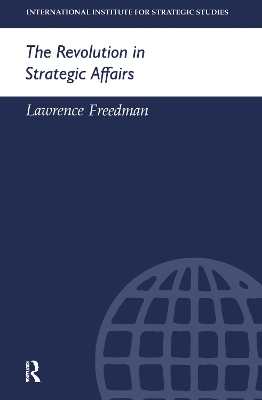Adelphi
1 primary work • 2 total works
Book 379
This book analyzes the strategic implications of the shift in focus for the US Armed Forces from regular to irregular war.
Lawrence Freedman closely examines the difficulty the US Armed Forces face in shifting their focus from preparing for regular wars, in which combat is separated from civil society, to irregular wars, in which combat is integrated with civil society. He argues that the political context of contemporary irregular wars requires that the purpose and practice of western forces be governed by liberal values, showing that this is also the case with regular wars, to the extent they occur, but it is the integration with civil society that makes the application of liberal values so challenging.
The Transformation of Strategic Affairs suggests that this challenge becomes easier to meet when military operations are understood to contribute to the development of a compelling narrative about the likely course and consequence of a conflict, in which these values are shown to be respected. At the same time, however, while it is vital that the employment of armed force remains sensitive at all times to the underlying political context, and sensitive to the role of narratives in shaping this context, the book shows that a key test of success will always be the defeat of the opposing forces. The `war on terror’ has highlighted these issues, and this Adelphi Paper concludes with much-needed suggestions for a strategic response.
This book will be of great interest to students of the US Armed Forces, politics, strategic studies and military history.
Rapid developments in information technology and precision weaponry are said to herald a 'revolution in military affairs' (RMA), making possible quick and decisive victories with minimal casualties and collateral damage. But has such a revolution taken place? The issues that drive conflict will persist, and many of the technical advances associated with the RMA will not necessarily produce a transformation in the nature of warfare. The end of the Cold War has highlighted another revolution one in political affairs. Major powers appear less likely to go to war with one another than they are to intervene in conflicts involving weak states, with potential opponents including militia groups, drug cartels and terrorists. RMA technology may be less suited to conflicts such as these.
If the cumulative effect of these changes has produced a revolution, it is a revolution in strategic, as much as military, affairs. This paper argues that:
- the RMA is the practical expression of a 'Western Way of Warfare', the key features of which are: professional armed forces; intolerance of casualties; and intolerance of collateral damage
- the key technological and conceptual components of the RMA were in place by the early 1970s. The trend has therefore been evolutionary, rather than revolutionary. The significant difference is in the new political setting of the end of the Cold War, and the revolution in perceptions of Western particularly US conventional military strength brought about by the Gulf War of 1991
- the Gulf conflict could mark the start of a true 'revolution' if future battles offer similar opportunities to exploit the RMA's technology. However, since the US and its allies appear unbeatable when fighting on their own terms, future opponents will fight differently
- the West will therefore face opponents who will follow strategies that contradict the Western Way of Warfare. They will avoid pitched battles, will exploit the West's reluctance to inflict civilian suffering, and will target their opponent's domestic political base, as much as its forward troops.
The problem for the West is not how to prevail, but how to do so in an acceptable manner. The more warfare becomes entwined with civilian activity, the more difficult it is to respond with the type of decisive and overwhelming military means embodied in the RMA. The RMA does not create a situation in which information is the only commodity at stake, and so does not offer the prospect of a 'virtual war'. The new circumstances and capabilities do not prescribe one strategy, but extend the range of strategies available. The issue underlying the RMA is the ability of Western countries, in particular the US, to follow a line geared to their own interests and capabilities.

